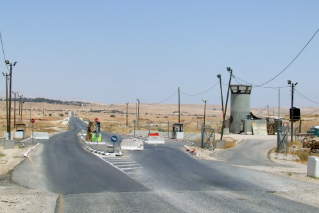 A checkpoint in the Jordan Valley
A checkpoint in the Jordan ValleyThe Israeli military decided to remove the restrictions on movement between the Jordan Valley and the rest of the West Bank. The military reached its decision eighteen months after the Association for Civil Rights in Israel (ACRI) sent a letter to the Minister of Defense requesting that he remove the burdensome restrictions.
The Jordan Valley runs along the eastern border of the northern part of the West Bank. There are four checkpoints between valley and the mountain range to its west: Tayasir, Hamra, Ma’ale Efrayim, and Yitav. Under current military policy, only cars whose drivers are registered residents of the Jordan Valley can enter or exit these checkpoints.
These travel restrictions embittered the lives of tens of thousands of people, mostly residents of the Jordan Valley and of the villages on the abutting ridge. Among other things, the restrictions:
- Substantially raised the prices of essential goods and services for the valley residents, most of whom live in small villages without proper infrastructure.
- Hampered the movement of goods between the West Bank and the Jordan Valley, and between the West Bank and its only international border – with Jordan.
- Disrupted or prevented farmers from villages on the mountain ridge from accessing and working their lands in the valley.
- Imposed severe restrictions on emergency medical evacuation and on medical treatment in the city centers of Tubas and Nablus.
- Hindered the transport of students from towns in the valley to schools on the mountain ridge and back
The travel restrictions also appeared to lack a rational basis or security justification. For the past few years the Yitav and Ma’ale Efrayim checkpoints (the traffic through which is relatively light) were manned only sporadically, meaning that much of the time, people could pass through them freely and without undergoing a security check. Similarly, cars were allowed to enter the valley from the south, via Jericho, from which point they could reach any of the same locations the western checkpoints purported to protect.
ACRI first raised the issue with the Ministry of Defense in 2007, and the ministry agreed to remove the restrictions, but did not implement its decision. In May 2011, Attorney Maskit Bendel of ACRI wrote to the Minster of Defense requesting that the arbitrary restrictions on Palestinian movement in and out of the Jordan Valley be lifted.
The new military policy removes the restrictions on Palestinians traveling between the Jordan Valley and the rest of the West Bank, aside from the seam zone and Hebron.
ACRI Attorney Maskit Bendel: “The restrictions in the valley seriously harmed the residents of the West Bank while it was unclear what security purpose they served. Alas, other routes into and out of the valley were totally free and no security check was carried out in them whatsoever. The removal of the restrictions is welcome, of course, but the question is why it had to be delayed so many years at the expense of the residents, and why it required ACRI’s repeated requests.”
To read ACRI’s request to the Minister of Defense to remove the travel restrictions (in Hebrew) click here.
To read ACRI’s letter to the State Comptroller and Ombudsman, sent after not getting a response from the Ministry of Defense (in Hebrew) click here.
To read the Ministry of Defense’s announcement regarding the removal of the travel restrictions (translated to English) click here.







